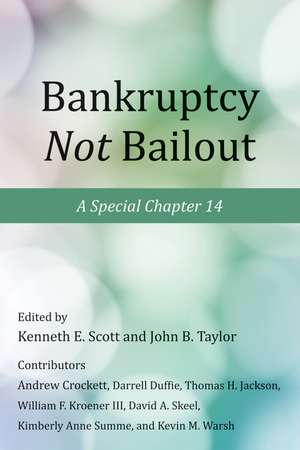Bankruptcy Not Bailout: A Special Chapter 14
Editat de Kenneth E. Scott, John B. Tayloren Limba Engleză Hardback – 14 sep 2012
Fixing Dodd-Frank—a new proposal for bankruptcy law
The events of the last several years on Wall Street make a compelling case for comprehensive, fundamental reform in the oversight of financial firms. In Bankruptcy Not Bailout, a group of expert contributors show why, if a new addition to the bankruptcy laws—Chapter 14—were implemented along with other genuine reforms, the changes could strengthen the US financial system and provide the impetus the US economy needs to thrive once again.
The authors reveal the weaknesses in Dodd-Frank Title II, showing how the current law creates an elaborate, and potentially cumbersome, bureaucratic procedure for triggering seizure of a financial company—and tell why Chapter 14 could greatly improve that process, creating greater financial stability and reducing the likelihood of bailouts. They lay the groundwork for a return to a clearer, more rules-based oversight regime that relies more on real capital and true market forces and urge adoption of a Chapter 14 even were Dodd-Frank left untouched.
CONTRIBUTORS: Andrew Crockett, Darrell Duffie, Thomas H. Jackson, William F. Kroener III, Kenneth E. Scott, David A. Skeel, Kimberly Anne Summe, John B. Taylor, Kevin M. Warsh
The events of the last several years on Wall Street make a compelling case for comprehensive, fundamental reform in the oversight of financial firms. In Bankruptcy Not Bailout, a group of expert contributors show why, if a new addition to the bankruptcy laws—Chapter 14—were implemented along with other genuine reforms, the changes could strengthen the US financial system and provide the impetus the US economy needs to thrive once again.
The authors reveal the weaknesses in Dodd-Frank Title II, showing how the current law creates an elaborate, and potentially cumbersome, bureaucratic procedure for triggering seizure of a financial company—and tell why Chapter 14 could greatly improve that process, creating greater financial stability and reducing the likelihood of bailouts. They lay the groundwork for a return to a clearer, more rules-based oversight regime that relies more on real capital and true market forces and urge adoption of a Chapter 14 even were Dodd-Frank left untouched.
CONTRIBUTORS: Andrew Crockett, Darrell Duffie, Thomas H. Jackson, William F. Kroener III, Kenneth E. Scott, David A. Skeel, Kimberly Anne Summe, John B. Taylor, Kevin M. Warsh
Preț: 144.32 lei
Preț vechi: 173.95 lei
-17% Nou
Puncte Express: 216
Preț estimativ în valută:
27.63€ • 28.72$ • 22.91£
27.63€ • 28.72$ • 22.91£
Carte indisponibilă temporar
Doresc să fiu notificat când acest titlu va fi disponibil:
Se trimite...
Preluare comenzi: 021 569.72.76
Specificații
ISBN-13: 9780817915148
ISBN-10: 0817915141
Pagini: 244
Dimensiuni: 133 x 203 x 28 mm
Greutate: 0.45 kg
Ediția:1st Edition
Editura: Hoover Institution Press
Colecția Hoover Institution Press
ISBN-10: 0817915141
Pagini: 244
Dimensiuni: 133 x 203 x 28 mm
Greutate: 0.45 kg
Ediția:1st Edition
Editura: Hoover Institution Press
Colecția Hoover Institution Press
Notă biografică
Kenneth E. Scott is a senior research fellow and the Ralph M. Parsons Professor of Law and Business Emeritus, Stanford University Law School.
John B. Taylor is the George P. Shultz Senior Fellow in Economics at the Hoover Institution and the Mary and Robert Raymond Professor of Economics at Stanford University.
John B. Taylor is the George P. Shultz Senior Fellow in Economics at the Hoover Institution and the Mary and Robert Raymond Professor of Economics at Stanford University.
Descriere
This book introduces and analyzes a new and more predictable bankruptcy process designed specifically for large financial institutions—Chapter 14—to achieve greater financial stability and reduce the likelihood of bailouts. The contributors identify and compare the major differences in the Dodd-Frank Title II and the proposed new procedures and outline the reasons why Chapter 14 would be more effective in preventing both financial crises and bailouts.
